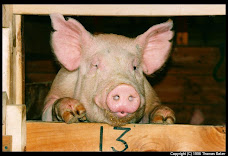Originally published February 22, 2008
Do we help or scold a beggar?
As I was leaving Circle K, I saw one human being approach another and ask for money, but I couldn't hear the story of why it was needed. The one who was asked became irate, his face turned red and he shook his fist a little and yelled something about getting a job. Most of the other human beings walked past with their heads down, avoiding eye contact and trying to slip by to avoid being approached. Some just said, "No thank you."
When I was 8, my dad gave me my first pocket knife. I remember the pride I felt when this gift was bestowed upon me. I held my breath in excitement as he demonstrated the different tools and blades. It had three blades; it wasn't shiny, but was older with a wood-like grip. He warned me not to open the third, smaller blade as it was stuck. Impressed with my new gift but also determined to see the unusable blade, I began working at it as soon as my dad left. After several attempts at grabbing the indention on the blade with my finger nail, it popped open, suddenly slicing my thumb down the middle in the process.
Quickly I was quieted: "Jeff, don't interrupt."
To which I whined, "But Mom . . ."
"No, Jeff, wait your turn."
"But . . ."
Without looking up, my mom said, "No, you need to learn to wait your turn."
I did a my-thumb-is-bleeding dance on the stairs while I waited for my turn until one of my parents looked up and noticed what had happened. Quickly, they rushed to help me. I think they still feel bad for making me wait to speak, but fortunately I survived the wrath of that mysterious third blade. They wanted me to learn not to interrupt, but when it came down to it, a bloody thumb is more important.
The ideals we hold are an important part of who we are. Accountability seems to be an important one of those ideals in our world, one that is even linked to the natural world. If an animal wants to survive, it must hunt, forage or do what it takes to find food.
In our world, a person is held accountable to earn his or her own wage. But as important as the ideal of accountability is, our ability to have compassion may be one the most distinguishing traits we have as humans. Compassion is when we say accountability doesn't always matter. We understand that people need help at times and that, as people ourselves, it is our moral obligation to help them.
The question is, at what point does accountability no longer matter? At what point does sticking to our ideals do more harm than good?
A lot of people seem to get upset, even mad, when asked for spare change. I've seen people I respect get physically upset at the sight of a homeless person.
"People should earn their money," they say.
People should. It would be nice. Even if someone should, if they haven't, perhaps can't or perhaps won't, then what?
Despite this "should," there is still a human being — a person — who doesn't have food to eat. When it comes to a person's survival, is teaching a lesson on accountability the best use of our resources?
Now compare the person at the Circle K to the Publix cashier who asks if you'd like to donate a dollar to the March of Dimes. I've never seen anyone lose it on them. Organized charities do great things, but what is it about organized charity that doesn't offend our sense of accountability like the man on the corner?
Having ideals is important, but why does everyone seem to suddenly have such strong ones when it comes to having compassion for another human being? This isn't about the homeless. They are simply an example of when we choose accountability over a bleeding thumb.

No comments:
Post a Comment